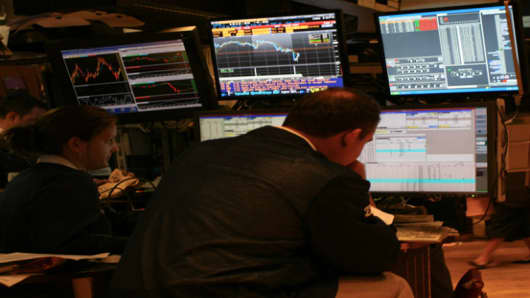Stocks started the fourth quarter with broad gains and the Dow closed at a new high as investors shrugged off earnings warnings from a handful of key financial companies.
"Given that Citigroup and UBS reported bad news yet the market still went up, the market is telling us is that all the bad news is already in there," said Douglas Peta, market strategist at J. & W. Seligman.
"Any big move up or down ahead of the jobs report may be premature because it's all subject to being reversed if that jobs number surprises us on Friday," Peta added.
Weaker-than-expected economic data prompted speculation of further interest rate cuts by the Federal Reserve.
U.S. manufacturing expansion slowed in September, as new orders and production slipped but employment improved. The Institute for Supply Management said its index of national factory activity fell to 52.0 from 52.9 in August, below economists' forecasted drop of 52.6.
An influential fixed income fund manager said the Federal Reserve is likely to further cut interest rates. William Gross, manager of the world's largest bond fund PIMCO, said subprime mortgage problems will dominate Federal Reserve policy "over the next several years" and believes short-term U.S. interest rates could fall as low as 3.75% over the next six to 12 months.
Investors shrugged off negative news from the financial sector and bought tech shares, sending the Dow Jones Industrial Average to a new record close. The blue chip index gained 191.92 points, or 1.4%, to close at 14087.55, the 33rd record close this year.
The broader S&P 500 closed up 1.3%, ending just 6 points below its record close of 1553.08 set on July 19. The Nasdaq Composite posted a gain of 1.5% and now sits at the highest levels since Feb. 2001.
"People are coming in and putting money to work," said Todd Leone, head of listing trading at Cowen and Company. "The market is acting pretty well -- the volume last week was extremely light -- there is more volume today and I think it's just the beginning of the quarter and you have a lot of mutual fund money coming in."
Five components in the Dow index, 3M, Exxon Mobil, McDonald's, Procter & Gamble and United Technologies, closed at record levels.
"People are expecting that the worst is behind us and they're throwing caution to the wind," said Sam Stovall, chief market strategist with S&P Equity Research. "The momentum plays are coming back into the picture, certainly in terms of the industrials but also those areas that have beaten down."
Technology stocks led the market higher after Nokia announced a large acquisition but the influential financial sector felt the ripple effects of negative guidance from Citigroup and UBS.
Nokia, the world's largest cellphone maker, offered $8.1 billion to acquire U.S.-based digital map supplier Navteq in its largest takeover ever. Analysts said the deal would give Nokia a stronghold in the navigation business, one of the fastest growing segments in the technology industry.
Citigroup, the largest U.S. bank by market value, said third-quarter net income will drop 60% on losses and writedowns stemming from subprime and leveraged loan woes, fixed income trading, as well as weakness in its consumer business.
Swiss bank UBSdisclosed $3.4 billion in losses driven by some of the same factors and raised questions about whether other banks which have not yet reported third-quarter results will also warn. Meanwhile, Swiss rival Credit Suisse said it was also hit by the credit crunch but that it would remain profitable in the third quarter.
"I think people are expecting there were some losers in the whole subprime (sector) and that not all of the bad news had come out yet," Rick Meckler, president of investment firm LibertyView Capital Management. "Now, for some of the banks, it's probably worse than people thought it would be."
New York light sweet crude futures continued to fall from record highs, closing below $81 on the New York Mercantile Exchange. A weak dollar helped check losses sparked by worries of an economic slowdown in top consumer the United States.
The benchmark 10-year Treasury rose, sending yields lower, as investors purchased safe-haven government bonds in light of weak ISM data and warnings from Citigroup and others.
In other company news, Nortel Networksnamed a new chief financial officer, sending shares higher. The telecom equipment company, North America's biggest maker of telecom equipment said industry veteran executive Pavi Binning will take over as CFO on Nov. 12.
Walgreen shares plunged after the drug retailer reported its first quarterly earnings decline in almost 10 years, citing lower reimbursements for some generic drugs and other expenses.
Jumpy Markets
The year's final quarter is traditionally the strongest period for U.S. stocks, but economists warned that this time it may be different.
Continued uncertainty in the credit and housing markets, a plunging dollar, higher oil pricesand the specter of a recession in the U.S. may weigh on stocks in October, and if a rally is going to happen, it will most probably take place in November or December, analysts said.
For the week ahead, economists predict volatility.
"As more news comes out like the UBS story, markets are going to get more jumpy," Elissa Bayer from Insinger de Beaufort told CNBC Europe.
European stocks recovered from early losses on Monday but investors remained cautious following negative news from UBS and Citigroup. Asian markets advanced in the afternoon session Monday. Japan and South Korea both finished higher but Australia gave up earlier gains to close just a touch lower.
The most important indicator of the week will be data on nonfarm payrolls and unemployment on Friday since another month of tepid jobs growth could prompt the Federal Reserve enough reason to cut interest rates at its next meeting.


